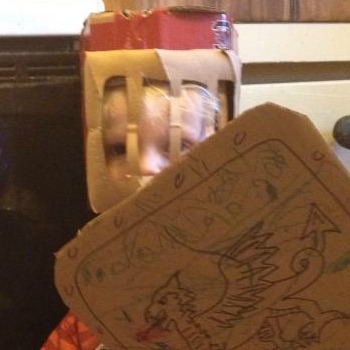"Let's battle!" is usually the first thing my 5-year-old, Falcon, says in the morning, after "I have to pee" and "I need to eeeeeeeeat" (all e's included). Two-year-old Bear usually says yes, as long as he has his special Black Sword. When Falcon finds his best friend, their hugs morph into tackles and beating. One of them sits on the other while they shriek. Then they get up and chase each other with 2-year-old Bear behind.
Or they throw balls at their cousin's head.
Or they jump off the couch.
Or they try to knock each other in the mud.
Or they take turns (this actually happened) hitting each other in the head with foam lightsabers.
This is normal.
It IS OK to let my kids roughhouse. It's OK to let them yell and play with sticks and hit and wrestle. In fact, kids need to roughhouse. It lets them connect with friends. It teaches them about limits: how hard is too hard? It teaches them conflict resolution. It seems to decrease aggression. Basically, they freaking need it.
So as long as all parties are consenting, Preschool Fight Club is on.

The first rule of Preschool Fight Club: You must talk about Preschool Fight Club. You must talk to the participants so they know the limits and boundaries. And you have to talk to other parents about it. Spread the gospel of roughhousing. Let other people know you're OK with your kids' behavior. It was other parents letting loose that let me see my kids' epic sword battles as normal.
The second rule of Preschool Fight Club: Everyone must consent to Fight Club. You can't push or hit or wrestle with someone who wants to be left alone. Everyone has the right to feel safe, and if roughhousing makes people feel unsafe, it ends. Consent can be withdrawn at any time (Falcon's best friend often sets the boundary at pulling clothes, and we have to stop and make a rule about it for everyone to feel safe enough to keep playing).
As Tyler Durden says, if someone taps out, the fight is over. Stop means stop or parents step in immediately: this teaches kids to respect each other's words and boundaries. Kids need to know No means No at a young age. My boys need to know that when someone says Stop, you damn well stop.
But we go further: if someone's body language says stop, you stop. I step in and point out things like, "Look. Jaden is running away and cowering under the couch. That means he's scared. Jaden, are you scared? Tell Falcon that." This teaches kids how to read social cues. They often truly don't realize their brother doesn't want a ball thrown at his face. One of the best reasons to let kids roughhouse? They learn conflict resolution. Usually they can handle it themselves, but you might need to step in sometimes.
And consenting to Fight Club extends to other parents -- if, on the playground, my child's behavior with their child makes them uncomfortable, it ends. Everyone has the right to feel safe. That includes parents. Side-eyes from bystanders don't count.
The third rule of Preschool Fight Club: It's all fun and games. The moment it turns angry, it ends. Roughhousing is not license to lash out aggressively. We can help kids learn the difference.
The fourth rule of Preschool Fight Club: Someone may get bashed too hard (but not badly), and that's OK. It's not OK to ignore it. You need to step in and address it: "I think you hit Falcon too hard. He is hurting. Can we talk about what happened?" Fight Club may need to stop and breathe for a while. It may need to break up. Or the pained party may just need to be comforted for a bit before running off to keep going.
The fifth rule of Preschool Fight Club: There's a time and a place for all things, and that time might be "not now" and that place might be "not here." Kids need safe spaces for rough play. If you create those spaces, the limits aren't so onerous. "You can stickfight in the yard at home later" is easier than "Put that stick down." "No sticks on the play structure" is easier than "No sticks." As a parent, you must make that space and that time. It's what makes the "not now, not here" OK.
The sixth rule of Preschool Fight Club: Parents must pay attention to Fight Club. If your kids are still learning (mine are) or hungry/tired/sad/2 years old, they can't handle battling out of sight. Someone will need to stop, and you need to be there to help. Not to punish -- you're the referee, not the mob enforcer. They are learning, and you must help.
So yes, this week, my son's best friend dragged him, by a piece of foam, across a gymnasium. We got side-eyes. But no one was hurting. No one was in danger. Both boys shrieked with the joy of it. I shrugged.
"No one's bleeding, no one's screaming, and we told them Not in the Face."
And it was awesome.
This originally appeared, in slightly altered form, on Manic Pixie Dream Mama.
 Like Us On Facebook |
Like Us On Facebook |
 Follow Us On Twitter |
Follow Us On Twitter |
![]() Contact HuffPost Parents
Contact HuffPost Parents
Also on HuffPost:
